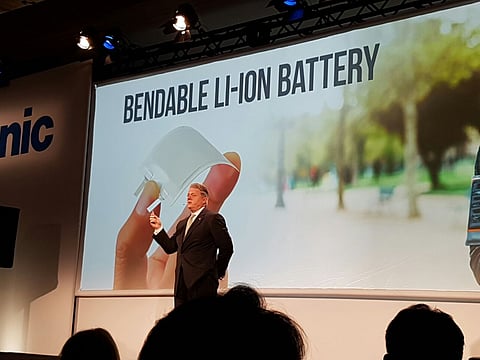Japan government sounds alarm over $7,500 US electric vehicle tax credits
Tokyo raises a number of concerns about tax credits in the Inflation Reduction Act

Highlights
- Tokyo warned that Washington's tax credits of up to $7,500 for US-made electric vehicles could deter further investment by the Japanese there and hit jobs.
- The Inflation Reduction Act (IRA) is designed to build more resilient supply chains as the US States aims to reduce exposure to China.
- Ultimately, Japan's auto lobby fears the IRA puts Japanese car makers at a disadvantage in their crucial North American market.
Tokyo: Japan's government warned on Saturday that new electric vehicle (EV) tax credits in the United States could ultimately deter further investment by the Japanese there and hit employment in the world's biggest economy.
In a comment submitted to the US Treasury Department, the government raised a number of concerns about the tax credits in the Inflation Reduction Act (IRA), which is designed to build more resilient supply chains as the United States aims to reduce exposure to China.
The statement is a culmination of months-long concerns shared by the Japanese government and the country's auto lobbying group that the IRA puts Japanese car makers at a disadvantage in their crucial North American market.
The requirements to be eligible for the tax credit are "not consistent" with the shared policy between the Japanese and the U.S. governments to build resilient supply chains by working with allies and partners, the government said.
"It would be possible that Japanese automakers hesitate to make further investments towards electrification of vehicles," the government said. "This could cause negative impacts on the expansion of investment and employment in the U.S." Japan joins South Korea and European countries that have already expressed concerns about the legislation.
South Korea's foreign ministry said on Friday it was seeking a three-year grace period on the law to enable its automakers to keep receiving EV incentives in the US.
$7,500 tax credits
Under the law, rules governing the current $7,500 EV tax credit aimed at persuading consumers to buy the vehicles will be replaced by incentives designed to bring more battery and EV manufacturing into the United States.
The domestic content requirements will ratchet up over the next six years.
New restrictions on battery sourcing and critical minerals, along with price caps and income caps, take effect on Jan. 1, which will potentially make all current EVs ineligible for the full $7,500 credit.
The US Treasury Department and the Internal Revenue Service started seeking public comment on the new law last month.
Inflation Reduction Act (IRA) requirements
The IRA requires automakers to have 50% of critical minerals used in batteries sourced from North America or American allies by 2024, rising to 80% by the end of 2026. Starting 2024, the foreign entity restrictions apply to vehicle battery components (i.e. cathode, anode, container, etc). From 2025, foreign entity restriction will apply to battery minerals (i.e. lithium, nickel, cobalt, manganese, etc).
US consumers seen 'disadvantaged'
The Japanese government said limitations on the range of vehicles that benefit from the EV tax credit will narrow the options available to U.S. consumers at affordable costs and may interfere with efforts to achieve the Biden administration's climate goals.
Japanese Industry Minister Yasutoshi Nishimura mentioned concerns about the law to U.S. Commerce Secretary Gina Raimondo at a meeting in Los Angles in September. The Nikkei newspaper reported Nishimura told his U.S. counterpart at the meeting the legislation may violate international law.
The Japan Automobile Manufacturers Association, a major Japanese auto lobby, said in August it was concerned about the law and would keep a close watch on developments.
Even some U.S. automakers have expressed apprehension about some aspects of the law.
Ford: U.S. should ease 'foreign entity' rules
Ford Motor Co said on Thursday the U.S. Treasury Department should limit the definition of a "foreign entity of concern" to ensure more electric vehicles can qualify for up to $7,500 in consumer tax credits. In August, Congress passed the $430 billion Inflation Reduction Act (IRA) legislation to restructure EV tax credits and, will, in the coming years, bar credits if any EV battery components were manufactured or assembled by a "foreign entity of concern" or if batteries contain critical minerals extracted, processed, or recycled by a foreign entity of concern. The rules were aimed at weaning the United States off the Chinese battery supply chain. "While Ford appreciates and supports the overall objective of the law to bolster the localisation of battery production and critical mineral mining and processing in the U.S. and with our trading partners and allies, an overly expansive interpretation of this provision risks undermining that very same objective by making the clean vehicle credit largely unavailable," the automaker said in comments filed with Treasury and sent to media. Ford said it wants the Biden administration to ensure joint ventures in critical mineral extraction, processing, or recycling "will not cause vehicles to be automatically excluded." The company also said any U.S.-organized company, regardless of its owners, should not trigger the foreign entity rules. Ford also said automakers need a "de minimis standard" as part of foreign entity reporting requirements "so that unintended traces of critical minerals do not disqualify consumers from getting a tax credit." Ford said in July it planned to import lower-cost lithium ion batteries for its North American electric pickup trucks and SUVs from Chinese battery giant CATL.
Sign up for the Daily Briefing
Get the latest news and updates straight to your inbox


